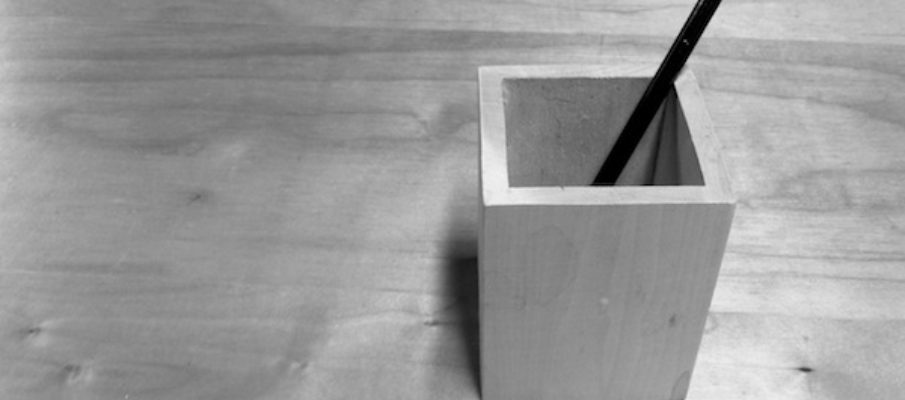Things always get better when I start throwing things away. When I make myself get rid of junk that doesn’t work, doesn’t matter, doesn’t contribute. My head clears and the money flows.
That’s because the freelance business model is inherently simple. Elegantly simple.
The simpler you keep it, the more profitable it is. You’ll be happier when you’re working pure. The business screams for simplicity.
Whenever my fellow bandits and I have driven ourselves into a ditch, it’s because we made things too complicated, or we jumped out of the truck to go chasing rabbits.
Start winnowing this afternoon. You will feel lighter and cleaner.
Less stuff, more work
How much gear does it take to ply your trade?
I bet it would all fit in a backpack. It would certainly fit in the overhead compartment.
What do you need, really?
A laptop, some software, an internet connection. Probably a cell phone. The email addresses of people you know.
Maybe all you need is your paintbox and easel. If you’re a designer, or if you write code, get a big monitor if you want.
Okay, and those pens you like.
But everything else is just baggage. The weight of it will drag you down and complicate things. Worse, that extraneous stuff will steal brain cycles from what matters.
When a hurricane knocked out my power for eleven days, I had to work like Charles Dickens, writing in pencil on lined paper near the light of a window. And by candle at night.
Yes, writing copy 1880’s-style was a pain in the ass, but it was a revelation. (For like the third time.) I realized I could still do 92% of what really matters in my business, which is putting new sentences on a blank page. It was just me and the work. That’s where the money is. All that gear I had to plug in? Peripheral convenience, maybe. Not core.
Leo Tolstoy built the 938 pages of War and Peace with only a pen and some bottles of ink. Legendary photographer Henri Cartier-Bresson reinvented photojournalism with a simple camera and a basic 50mm lens. Do I truly need a room full of electronic crap to write a 700-word article?
I’m not arguing against tools or technology. I’m advising you to stop needlessly cluttering up your business life with stuff that doesn’t matter, with junk that lets you pretend you are actually doing something. I can scold you only because I am a master at diverting myself with such nonsense.
For years I was addicted to Staples office supplies. I would buy baskets of notepads, sticky notes, microfiber mouse pads, colored file folders, bulldog clips. I would agonize between the narrow-ruled, or wide-ruled composition books. Each time, I thought I had found the secret getting my act together, finding my identity.
None of it made a lick of difference. Ever.
I would fantasize what they’d say about me, the ingeniously famous copywriter, in that article they were going to write. “His favored tools? The decidedly retro Palomino Blackwing pencils 602 with the removable erasers, and the Field Notes FN-02 plain paper version.” They never wrote that article, never asked me that. I bought those pencils for nothing.
I had the same problem with apps. Each new download was going to make me a killer copywriting machine.
Never happened. Not once.
The rule is, if the app hasn’t made you $63,000 or more, or you haven’t touched it in a month, delete the thing. It is just mud on your shoes.
If you manage to double your business this year, it won’t be because you switched to online invoicing, or because you chose Emma over Mail Chimp for your email campaign, or because you fired up Notational Velocity, or because you integrated Pinterest, Twitter, and Google+ into your social media strategy.
It will be because you got really good, and found a way to delight some clients, or thought of something interesting to say. Everything else is the in the 10% category, “other.”
Clean out your head
You don’t need a productivity tool. You don’t need ‘Getting things done.’ That is for corporate drones.
Here’s the lean and simple version.
First thing, when you hit the desk in the morning, dig into the paying work that is on your desk.
Do the paying work first. Start with the work nearest to an invoice.
When you finish with the paying work, look for other work. You send emails, offer ideas, do estimates and proposals, contact people you once worked with, talk to colleagues about getting referrals. You check in with your best clients.
Or — but be careful here — you’re creating things that will attract clients.
Maybe a blog, an online portfolio, provocative articles, prototypes, YouTube videos. I say be careful because it’s easy to get sucked deep into the technicalities and busywork of it all and forget what you’re doing. You are trying to attract clients, or to build something to link to when you contact them. Simple.
You have one plan for the day. You’re delivering work, or you’re talking to people about work. You cannot make it simpler. You can only gum it up.
The proportions will change day to day. But the to-do list is always the same. Do not over-think this.
Empty the junk drawer
This morning I saw that someone had unsubscribed from the The Freelancery. I don’t know who it was.
My first reaction was that sting of rejection. Someone found the blog useless. Or they moved on.
Either way, ouch.
But whoever it was, they did the right thing. They’re streamlining, lightening the load.
Wait, I didn’t mean that.
